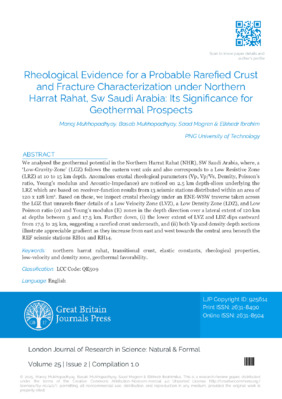Rheological Evidence for a Probable Rarefied Crust and Fracture Characterization under Northern Harrat Rahat, Sw Saudi Arabia
Keywords:
Northern Harrat Rahat, Transitional crust, Elastic constants, Rheological properties, low-velocity and density zone, geothermal favorability.Abstract
We analysed the geothermal potential in the Northern Harrat Rahat (NHR), SW Saudi Arabia, where, a �Low-Gravity-Zone� (LGZ) follows the eastern vent axis and also corresponds to a Low Resistive Zone (LRZ) at 10 to 15 km depth. Anomalous crustal rheological parameters (Vp, Vp/Vs, Density, Poisson�s ratio, Young�s modulus and Acoustic-Impedance) are noticed on 2.5 km depth-slices underlying the LRZ which are based on receiver-function results from 13 seismic stations distributed within an area of 120 x 128 km 2 . Based on these, we inspect crustal rheology under an ENE-WSW traverse taken across the LGZ that unravels finer details of a Low Velocity Zone (LVZ), a Low Density Zone (LDZ), and Low Poisson ratio (?) and Youngs modulus (E) zones in the depth direction over a lateral extent of 120 km at depths between 5 and 17.5 km. Further down, (i) the lower extent of LVZ and LDZ dips eastward from 17.5 to 25 km, suggesting a rarefied crust underneath, and (ii) both Vp and density depth sections illustrate appreciable gradient as they increase from east and west towards the central area beneath the REF seismic stations RH01 and RH14. The LVZ, LDZ and Low Poisson Ratio (?) and Youngs Modulus (E) zones under NHR probably owe its origin to a raised geotherm in fractured crust that alters the crustal rheology and showing correspondence to vent axes. Compartmentalization of geophysical properties by orthogonal fractures/faults is used to propose a probable geologic model of heat transfer in the NHR.
References

Downloads
Published
Issue
Section
License
Copyright (c) 2025 Authors and Global Journals Private Limited

This work is licensed under a Creative Commons Attribution 4.0 International License.





